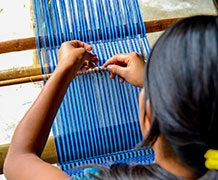
The day aims to heighten awareness around ethical fashionand provide a window to bring about real change. Image courtesy Shutterstock.com
Factory disaster marked with Fashion Revolution Day
University of Exeter Geography students have designed a fashion ethics card game as part of a series of global events and initiatives commemorating the first anniversary of the Rana Plaza factory disaster.
On April 24 last year, 1,133 people were killed and many more injured when the clothing complex collapsed in Dhaka, Bangladesh. Benetton, Matalan, Bon Marche and Primark branded clothing were found in the rubble.
After the collapse, dozens of brands quickly signed a binding agreement to improve factory safety in Bangladesh, and a small number offered compensation to the victims and their families.
The horrific event has been seen by many as an ethical turning point in the fashion industry and – one year on – it is being commemorated worldwide by a group of ethical fashion pioneers, NGOs, journalists, academics and others as ‘Fashion Revolution Day.’
Its advisory board includes Dr Ian Cook, Associate Professor in Geography at the University of Exeter and coordinator of followthethings.com, who is contributing a Fashion Ethics trump card game designed by a group of his undergraduate Geography students.
The game, which you make and play with your own clothes, can be found and downloaded from: http://fashionrevolution.org/wp-content/uploads/2014/03/FRD_trumpcards_A4_.pdf
Dr Cook said: “What happens when we learn something about, or maybe get to know, the people who make clothes for us? That's the 'follow the things' question, which the Rana Plaza collapse brought shockingly to mainstream media attention around the world last year. Fashion Revolution Day aims to keep that question alive, in all of our minds. The card game will, we believe, help to do this. I'm happy to support Fashion Revolution Day. It's important to be involved.”
“The idea for Fashion Revolution Day came to me in the bath,” said founder of Fashion Revolution and ethical fashion pioneer, Cary Somers. “I saw that the Rana Plaza disaster could act as a catalyst, with the heightened awareness around ethical fashion providing a window to bring about real change. Fashion Revolution Day represents an exciting opportunity to reconnect fashion-lovers with the people who made their clothes.”
Getting involved can be as simple as wearing an item of clothing inside out so that the label is displayed, with the aim of sparking conversations about who made the garment. The clothing can also be photographed and shared with the hashtag #insideout on all social networks.
Dr Cook and a small group of Exeter Geography students will be involved in Fashion Revolution Day’s social media reporting in London on the 24th - Follow @Fash_Rev and @followthethings for updates.
Global events will include a mass catwalk in the centre of Barcelona; a workshop in Nepal on how to clean up waste water from dye houses; a fashion show in Bangladesh with producers wearing the clothes they make and a touring exhibition in Swaziland.
Carry Somers will be back to talk to Exeter students for the Grand Challenge on 'Fashion ethics after the Rana Plaza Factory Collapse,’ where students and academics will be talking fashion with people working and shopping in Exeter's city centre in the first week of June.
Date: 24 April 2014
